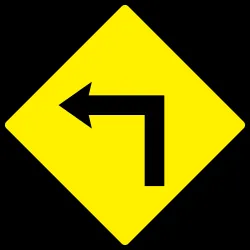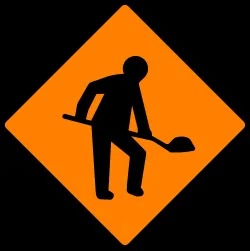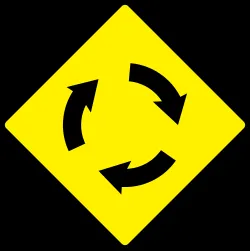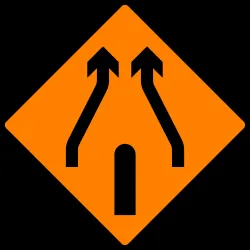Category A Driving Theory Test 1
01/40
1.If a driver sees this sign on a road in rural Ireland, particularly where two roads meet, what might be the underlying reason for its placement?
Mandatory turn signs are often used at junctions where going straight or turning right might be unsafe, prohibited (e.g., private access, unsuitable road conditions., or where traffic needs to be specifically routed to a main thoroughfare or a different road system for efficiency or safety reasons.
01/40
Progress
Category A Driving Theory Test 1
02/40
2.What does this warning sign indicate on an Irish road?

The bold left-angled arrow indicates a sharp turn to the left ahead. It is used to warn drivers to slow down and prepare for a significant directional change in the road.
02/40
Progress
Category A Driving Theory Test 1
03/40
3.What is the correct action when you encounter this octagonal red sign with the word STOP at an Irish junction?
This red octagonal STOP sign is a regulatory sign used throughout Ireland to indicate that drivers must come to a complete stop at the stop line. It is typically placed at junctions with poor visibility or high-risk intersections. According to the RSA (Road Safety Authority) guidelines, you must stop completely even if the road looks clear and only proceed when it is safe. Failing to stop can result in penalty points or fines, and increases the risk of collisions.
03/40
Progress
Category A Driving Theory Test 1
04/40
4.What information does the 200 m sign convey to a driver?
This sign, labeled Distance, clearly indicates a measurement in meters, signifying a particular distance.
04/40
Progress
Category A Driving Theory Test 1
05/40
5.A sign ahead alerts drivers to ongoing road construction or maintenance, urging them to proceed carefully. How does this sign ensure safety for everyone on the road?

The sign with a worker holding a shovel is universally recognized as Road works ahead, signaling that construction or maintenance activities are in progress and drivers should be alert for potential hazards like uneven surfaces, reduced speed limits, or stopped vehicles.
05/40
Progress
Category A Driving Theory Test 1
06/40
6.What crucial information does the orange diamond sign, featuring a person, typically convey to drivers?
This diamond-shaped sign is a warning sign often seen in roadwork zones. The symbol of a person holding a paddle specifically indicates that traffic will be controlled by a human flagger or stop/go person.
06/40
Progress
Category A Driving Theory Test 1
07/40
7.At an uncontrolled intersection in Ireland, who has the right of way?
When approaching an uncontrolled intersection, vehicles on the right have priority. This rule ensures orderly traffic movement and prevents confusion among drivers.
07/40
Progress
Category A Driving Theory Test 1
08/40
8.What is the default speed limit in built-up areas (urban zones. in Ireland?
The standard speed limit in built-up areas is 50 km/h unless otherwise posted.Residential streets and urban areas enforce this limit to reduce the risk of collisions. Drivers should be cautious of pedestrians, cyclists, and parked vehicles.
08/40
Progress
Category A Driving Theory Test 1
09/40
9.What is the correct lane to drive in on an Irish motorway when not overtaking?
On Irish roads, the left lane is for regular travel; right lanes are for overtaking.Drivers should stay in the left lane for normal driving and only move right when overtaking. Staying in the correct lane ensures smooth traffic flow and prevents unnecessary congestion.
09/40
Progress
Category A Driving Theory Test 1
010/40
10.Where is parking always prohibited in Ireland?
Double yellow lines mean no parking at any time, even temporarily.
010/40
Progress
Category A Driving Theory Test 1
011/40
11.When is using the horn allowed in Ireland?
Horns should only be used to alert others of immediate danger,such as an approaching vehicle, a pedestrian in harm’s way, or to prevent a collision
011/40
Progress
Category A Driving Theory Test 1
012/40
12.In Ireland, what is the law regarding holding a phone while operating a vehicle?
The law prohibits using handheld phones under any circumstance while driving, including scrolling through social media, checking notifications, or using GPS manually.
012/40
Progress
Category A Driving Theory Test 1
013/40
13.What is a key recommendation for drivers in school and residential zones, according to the provided text?
The first point explicitly states Reduced speeds as part of School and Residential Zone Conduct, indicating the importance of driving slower in these areas for safety.
013/40
Progress
Category A Driving Theory Test 1
014/40
14.What is the required minimum overtaking distance when passing cyclists at over 50 km/h in Ireland?
Irish road safety law requires a minimum overtaking clearance of 1.5 metres when driving over 50 km/h. This safe distance helps prevent side-swipe collisions and gives cyclists space to react to obstacles.
014/40
Progress
Category A Driving Theory Test 1
015/40
15.What is the consequence of failing to obey a traffic light in Ireland?
Disobeying traffic lights is a traffic offence under Irish law. It usually results in a u20ac200 fine and 3 penalty points on your licence. This penalty discourages risky behavior at junctions and promotes orderly traffic flow.
015/40
Progress
Category A Driving Theory Test 1
016/40
16.Who is responsible if a child is not wearing a seatbelt in a car?
Under Irish law, it’s the driver’s duty to ensure passengers under 17 are properly restrained. Negligence can lead to fines and endanger the child’s life.
016/40
Progress
Category A Driving Theory Test 1
017/40
17.What is the legal blood alcohol limit for fully licensed drivers in Ireland?
Fully licensed drivers in Ireland must not exceed 50mg of alcohol per 100ml of blood. Higher levels impair driving and result in penalties.
017/40
Progress
Category A Driving Theory Test 1
018/40
18.What is a key part of staying alert while driving?
Defensive driving requires full awareness of your surroundings, including blind spots and changing traffic. This reduces reaction time and helps prevent collisions in complex traffic scenarios.
018/40
Progress
Category A Driving Theory Test 1
019/40
19.What is your obligation when approaching a STOP sign in Ireland?
In Ireland, a STOP sign legally requires a full stop, regardless of traffic conditions. Its not optional. Failing to stop can result in penalty points and endangers intersections.
019/40
Progress
Category A Driving Theory Test 1
020/40
20.What should you do when driving in heavy rain on Irish roads?
In Ireland, low beams improve visibility in rain without blinding others. Reducing speed lowers the risk of aquaplaning or losing control on wet surfaces.
020/40
Progress
Category A Driving Theory Test 1
021/40
21.If your brakes fail while driving in Ireland, what’s the first thing you should do?
Pumping brakes can restore pressure. Using a lower gear helps slow the car. Irish driving manuals teach controlled response to mechanical failure.
021/40
Progress
Category A Driving Theory Test 1
022/40
22.How can stress impact your driving behaviour?
Stress causes impulsive decisions. The RSA (Road Safety Authority. in Ireland encourages stress management to prevent road rage or rash moves.
022/40
Progress
Category A Driving Theory Test 1
023/40
23.Why is it important to monitor side roads while driving through towns in Ireland?
Hazards often come from unexpected directions. Urban driving in Ireland requires full attention to surroundings.
023/40
Progress
Category A Driving Theory Test 1
024/40
24.What is the first action to take if your vehicle breaks down on a motorway in Ireland?
Always exit the vehicle through the passenger side and wait behind the safety barrier. Motorways in Ireland are high-speed zones, and staying inside or in front of the vehicle is extremely dangerous.
024/40
Progress
Category A Driving Theory Test 1
025/40
25.What is the most fuelu2011efficient way to accelerate from rest?
Gradual acceleration reduces fuel consumption. In Ireland, smooth acceleration on city streets helps improve MPG and lowers COu2082 emissions, benefiting both environment and wallet.
025/40
Progress
Category A Driving Theory Test 1
026/40
26.What does situational awareness help drivers do on Irish roads?
Good situational awareness helps drivers anticipate potential dangersu2014such as a sharp bend or merging laneu2014allowing timely and safe decisions, especially on narrow or winding Irish roads.
026/40
Progress
Category A Driving Theory Test 1
027/40
27.If this sign is placed just after a roundabout exit in an Irish town, what specific purpose might it serve?
This sign can be used in conjunction with one-way systems. If placed at the end of a one-way street or immediately after an exit, it might mandate the next turn to ensure vehicles continue on a designated flow, preventing them from going against the traffic or entering restricted areas.
027/40
Progress
Category A Driving Theory Test 1
028/40
28.What does this road warning sign indicate?

It prepares drivers to slow down and yield to traffic already on the roundabout.
028/40
Progress
Category A Driving Theory Test 1
029/40
29.What does the inverted triangular sign with a red border and the word YIELD mean?
The YIELD sign (also known as a Give Way sign in some contexts. indicates that you must be prepared to stop and give priority to traffic on the road you are joining or entering, or to traffic already on a roundabout. You only proceed when it is safe to do so without causing other vehicles to change speed or direction.
029/40
Progress
Category A Driving Theory Test 1
030/40
30.What is the primary purpose of a sign stating FOR X km in both English and Irish?
The sign, clearly labeled Length, specifies the extent in kilometers over which a particular situation, such as roadworks, a traffic calming zone, or a specific lane use, will apply.
030/40
Progress
Category A Driving Theory Test 1
031/40
31.If you encounter a sign displaying an upward-pointing arrow splitting into two arrows that then converge back into one, what does it signify about the road ahead?

This specific design indicates the End of obstruction between lanes, meaning the temporary obstacle that divided traffic has concluded, and lanes are returning to normal configuration.
031/40
Progress
Category A Driving Theory Test 1
032/40
32.In terms of traffic control, what is the absolute requirement when you see a red circular sign displaying STOP?
A red STOP sign is a regulatory sign demanding a full and complete stop. It is a legal requirement to stop before proceeding safely.
032/40
Progress
Category A Driving Theory Test 1
033/40
33.What must a driver do when approaching a roundabout?
Always give way to vehicles already on the roundabout.Cars entering a roundabout must wait for those already circulating before proceeding. Failure to yield can cause disruptions or potential collisions within the roundabout.
033/40
Progress
Category A Driving Theory Test 1
034/40
34.What is the general speed limit on national primary and secondary roads outside urban areas?
These roads typically have a 100 km/h speed limit unless signs indicate otherwise.National roads outside urban areas allow higher speeds while maintaining safety. Drivers must watch for signs indicating lower limits near villages or hazards.
034/40
Progress
Category A Driving Theory Test 1
035/40
35.When is it appropriate to use the right lane on a motorway in Ireland?
The right lane should only be used for overtaking.Overtaking should be done safely and promptly, ensuring no oncoming vehicles are too close. Lingering in the right lane unnecessarily can create roadblocks and frustrate other drivers.
035/40
Progress
Category A Driving Theory Test 1
036/40
36.Can you stop on a clearway during restricted hours?
Clearways are zones where stopping is not allowed during posted hours except for buses and taxis.
036/40
Progress
Category A Driving Theory Test 1
037/40
37.Can you use the horn near hospitals at night?
Horn use is restricted near hospitals or at night in quiet areas, including near hospitals, schools, and quiet residential zones, to minimize noise disturbances.
037/40
Progress
Category A Driving Theory Test 1
038/40
38.Which of the following is a likely punishment for using a phone while driving?
Offenders may face escalating penalties, such as higher fines for repeated violations, license suspension, and even mandatory driving courses.
038/40
Progress
Category A Driving Theory Test 1
039/40
39.Why is driving slower in school zones so important?
Slower speeds help keep pedestrians, especially children, out of harms way.
039/40
Progress
Category A Driving Theory Test 1
040/40
40.When driving near a cyclist in a narrow lane, what is the safest and most appropriate action you should take?
In a narrow lane, there may not be enough space to safely overtake a cyclist while maintaining the recommended safe passing distance (1.0 metre in urban areas and 1.5 metres outside urban areas in Ireland.. Dropping back and waiting ensures you can give them sufficient room when its safe to pass, preventing close calls or forcing them into hazards.
040/40
Progress
- 1
- 2
- 3
- 4
- 5
- 6
- 7
- 8
- 9
- 10
- 11
- 12
- 13
- 14
- 15
- 16
- 17
- 18
- 19
- 20
- 21
- 22
- 23
- 24
- 25
- 26
- 27
- 28
- 29
- 30
- 31
- 32
- 33
- 34
- 35
- 36
- 37
- 38
- 39
- 40
0/40
Progress
0
Correct
0
Incorrect

Ace the DMV Exam on Your First Attempt
Unlimited mock tests
Access Over 1000 Exam Like Questions for Just $3

Ace the DMV Exam on
Your First Attempt

 Pass the Exam Easily with Detailed 3-Level Practice | 1-Day Full Access Free — Offer Ends in
Pass the Exam Easily with Detailed 3-Level Practice | 1-Day Full Access Free — Offer Ends in


